Vasily Petrov: an officer who fought without hands
During the Great Patriotic War, Vasily Stepanovich, commanding artillery units, showed military courage and courage. He went through the whole war from the first to the last of her days. In the battles with the Nazi invaders, he was wounded three times, lost both hands. After long treatment, he returned to the regiment and remained in the ranks until the end of the war. Homeland appreciated the merits of her glorious son. He was twice awarded the title of Hero of the Soviet Union (24 December 1943 and 27 June 1945), and was also awarded numerous orders and medals.
Petrov Vasily Stepanovich was born on March 5 (according to other data on June 22) 1922 of the year in a small village Dmitrievka, located today in the Priazovsky district of the Zaporozhye region, of Russian nationality. The future officer's childhood was hard to call cloudless, it was difficult and in many ways tragic. Already at the age of three years, he lost his mother, and in 1930-s for the participation in the civil war on the side of whites his father was repressed, in 1933, during the famine in Ukraine, his brother died, he himself miraculously survived. In the 1939 year after graduating from Novovasilyevsk secondary school, he entered the Sumy Artillery School, which he graduated from in the 1941 year.
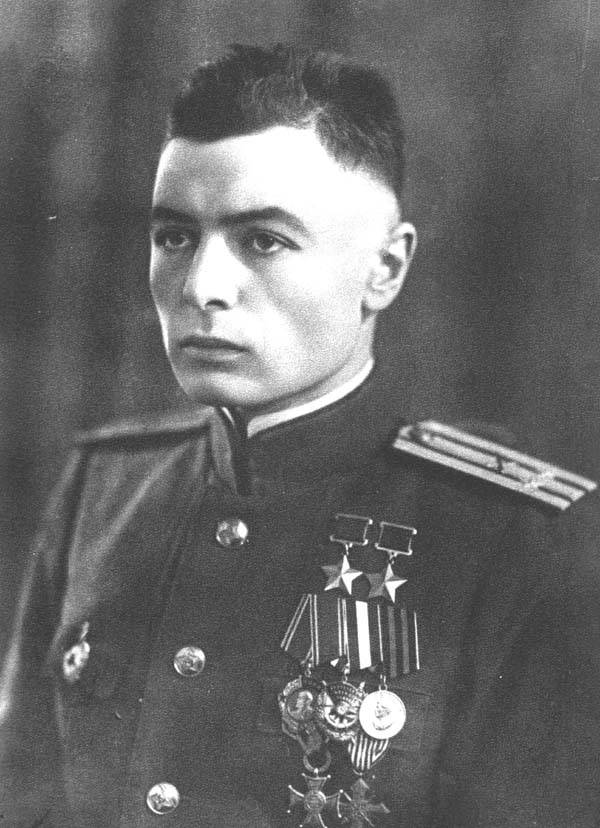
A young artillery officer who had just graduated from school arrived in his unit on the eve of World War II, in the middle of June, 1941. 22 June 1941, the future general, but for now the lieutenant, deputy commander of the 3 battery 152-mm howitzer 92-th separate artillery battalion, met in the city of Vladimir-Volyn. This division was part of the Vladimir-Volyn fortified area. Together with the 85-th separate artillery division, he was supposed to provide artillery support for the defense units of the south-west front of the Ur, and also cover its field filling, which was provided by the 87-Infantry Division.
Throughout the first day of the war, the 3rd battery supported the defending Soviet units with its fire, and by the end of the day, according to the memoirs of Vasily Petrov, it was attacked by the German tanks. Gunners were able to repel this attack, destroying two tanks. At the same time, in battles on June 22, the division suffered losses in people and equipment, the Germans seized its depots and by night the gunners were left without shells. Parts of the division were surrounded, in these conditions, it was decided to destroy the remaining tractors and guns and go to their on foot.
Thus began the Great Patriotic War for the future, twice Hero of the Soviet Union, Vasily Petrov. That tragic summer, he took direct part in battles with invaders near Vladimir-Volynsky, Kovel, Lutsk, Malin and Chernobyl. With fights, he escaped from the encirclement near Kiev, which was by no means all of the participants in that battle. In the same year, 1941 was assigned to IPTAP - the anti-tank artillery fighter regiment. It was the anti-tankists who were the first to meet the enemy, being on the front line, they were firing duels with enemy armored vehicles. Front-line soldiers know that it was a complete hell, rarely when firing at enemy tanks with direct fire ended without loss in batteries.
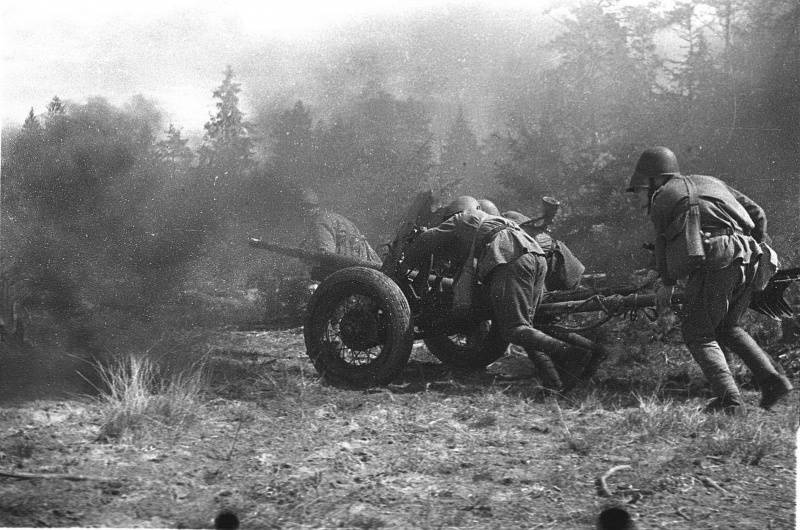
Petrov Vasily Stepanovich fought on the Southern, Voronezh and 1-m Ukrainian fronts. In the winter and spring of 1942, he was involved in heavy fighting near Kharkov, Stary Oskol, Lozova. Having shown courage, resourcefulness and self-control, he managed to remove his battery (personnel with heavy equipment) from the Kharkov boiler with minimal losses. At the same time, Petrov served at IPTAP in both 1942 and 1943. They started talking about the battalion commander Vasily Petrov after the crossing into the front legends over the bridge set across the Don River set on fire and destroyed by German bombers. After this crossing, the battery managed to quickly turn around and repel the attack on the crossing of German tanks.
14 September 1943, Captain Vasily Petrov repeated this fight, but the river was already different. At that time, he was already the deputy commander of the 1850 th IPTAP, which was part of the 32 th separate anti-tank artillery brigade of the 40 th army of the Voronezh Front. He distinguished himself in battles on the Left-Bank Ukraine, while crossing the Dnieper and holding the bridgehead on its right bank. 14 September 1943 near the village of Cheberyaki (today it is the Romensky district of the Sumy region), captain Petrov, under heavy bombardment from the air and artillery fire of the enemy, quickly and without loss managed to organize the crossing of three batteries across the Sul river. Two hours after the crossing, the batteries underwent a counterattack, they were attacked by 13 tanks and before the infantry battalion. Quickly assessing the situation, Vasily Petrov let the enemy in on the 500-600 meters, after which he opened fire from all the guns. As a result, the gunners shot down 7 German tanks and destroyed up to two companies of infantry, the attack of the Nazis choked.
But at this time before the 150 the Germans went to the rear of the artillerymen and opened heavy fire from an automatic weaponsseeking to surround the batteries and take them prisoners. Captain Petrov did not lose his head and turned the 6 guns towards the enemy’s infantry, opening a disastrous fire on them with a canister. At the same time, he assembled the soldiers of the platoon command and control of all people free from guns and personally led them to attack the enemy. After a two-hour battle, he managed to repel this German attack, destroying enemy soldiers and officers before 90, and the Germans managed to capture 7, the rest fled. At the same time, Captain Vasily Petrov was wounded in the shoulder, but remained in the ranks.
23 September 1943 of the year, replacing the regiment commander who failed, Petrov, with the help of the regiment's forces and means, was the first in the brigade to quickly and skillfully force the Dnieper overnight, sending material, personnel and ammunition across the river. His batteries occupied battle formation and firmly held the bridgehead, reflecting the attacks of the enemy. It was the instruments of Petrov that became the first artillery of the Bukrin bridgehead.
October 1 1943 of the next German tank attack, Vasily Petrov was in combat formations of the 1 and 2 batteries, he personally led their fire. Under his direct supervision, the gunners shot down an 4 tank and destroyed the Nazis' six-barrel mortar 2. When in the 3-th calculation of the 1-th battery, the Germans with their fire brought down all the personnel, Petrov, along with his orderly, himself went to the gun. Together, they continued to fire at the enemy, were able to set up a self-propelled unit, they fought until the direct hit of a projectile gun was put out of action, and Petrov himself was seriously wounded in both hands. Thanks to the courage and courage of Captain Petrov, who was able to inspire the soldiers and commanders of the regiment with his personal example, the gunners of the Germans ’4 counterattack the bridgehead on that day.
At the same time, a serious injury almost cost him his life and made him disabled. His comrades brought the seriously wounded captain to Kovalin, where the medical battalion was located. At that time, he was overwhelmed with the wounded and they did not begin to operate as a hopeless person. According to the memoirs of the hero himself, there were a lot of dead, the funeral team did not have time to bring the bodies to the ground and they were simply demolished to the walls of destroyed houses and sheds. Petrov was taken to one of these sheds, where he lay for almost a day. Found it, thanks to the search, which was organized by the brigade commander. The officers went in search, because they wanted to bury their officer and comrade, but in the end they found him alive among the dead and at gunpoint forced the surgeon to perform an operation. He immediately warned them that the chance of survival would be minimal, but the operation was successful. A few weeks later, in late November - early December 1943, the U-2 plane Vasily Petrov was taken to the Moscow Institute of Orthopedics and Prosthetics. December 24 1943 was issued by decree of the Presidium of the Supreme Soviet of the USSR, Captain Petrov Vasily Stepanovich, for successfully crossing the Dnieper, retaining the bridgehead and showing courage and resilience to the title of Hero of the Soviet Union.
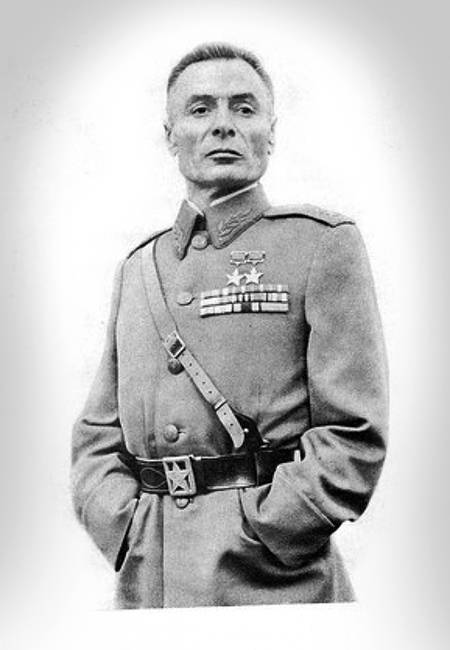
The time in the hospital was very difficult. First, Vasily Stepanovich suffered from severe pain. In order to drown out the pain and mental suffering, he smoked a lot, smoking sometimes up to 100 cigarettes a day. Later, when the pain from the wounds subsided, the realization of the tragedy of his position came to him, then he thought that life had lost its meaning forever: what could the officer who had lost both hands fit with? But the brave and courageous man, and Vasily Stepanovich, of course, was such, managed to overcome all the trials and tribulations that fell to his lot. In the end, he came to the idea that he lost his hands, but most importantly - the ability to manage the battle and managed to maintain self-esteem. He was advised to remain in the rear, offered the post of second secretary of one of the district committees in Moscow, but he did not agree and in the spring of 1944, he returned to the front in his unit. He could not be detained by a medical commission or personnel officers. In the regiment of their commander met solemnly and warmly, as the most dear person.
Already in the 1945 year, when Soviet troops marched across German soil, the armless major artillery hero of the Soviet Union was legendary at the front. They said that he was fabulously brave, and the anti-tank batteries, which he commanded, destroyed a huge number of tanks, leaving behind literally graveyards from destroyed German equipment. Moreover, not everyone then believed that the legendary major existed in reality, but life sometimes turns out to be more amazing than any myths and legends.
Moreover, in 1945, Major Vasily Stepanovich Petrov became the twice Hero of the Soviet Union. By that time, his unit had already become a guard. The commander of the 248 Guards Fighter Anti-Tank Artillery Regiment (11-I Guards Anti-Tank Brigade, 52 Army, 1 of the Ukrainian Front) Guards Major Vasiliy Petrov distinguished himself in battles on the Oder bridgehead. 9 March 1945, the large German forces counterattacked in the Paul-Gros-Neukirch area, their task was to drop the Soviet units from the bridgehead on the west bank of the Oder River. In the battle of the guard, Major Petrov courageously and skillfully led the regiment's actions, personally presenting in the battle formations of the batteries under a very strong machine-gun and enemy artillery-mortar fire, repeatedly risking his life. During the battle, which lasted about two hours, the gunners were able to repel the German attacks 5, not allowing it to crossings. In battle, the regiment destroyed 9 tanks and about 180 enemy soldiers and officers.
15 March 1945 of the year in a battle to break through the German defenses on the west bank of the Oder River Vasily Petrov again showed uncompromising courage and a high level of operational leadership of the regiment entrusted to him. Under his direct leadership, the gunners destroyed 4 artillery guns, 13 gun emplacements and up to 120 Nazis.
19 April 1945 of the year in fierce battles with the Germans in the area of Niska Guards Major Vasily Petrov again proved himself heroic. The Germans, concentrating large forces of tanks and infantry, launched a series of tangible attacks in the direction of the Rothenburg-Niski highway, trying to cut the road along which Soviet units advanced on Dresden. In order to engage in a more advantageous anti-tank defense line, Petrov led to the attack two assault batteries at a settlement occupied by the Germans. Thanks to the skillful and effective combination of direct-fire guns with automatic machine-gun fire, as well as the exceptional bravery of the regimental commander, the Nazis managed to defeat the Edernits-Wilhelminental settlement, which allowed the main forces of the regiment to gain a foothold on the advantageous line of defense. Later, the Germans went over to counterattacks several times, but the regiment led by Vasily Stepanovich successfully repelled them, destroying 8 tanks and, before 200, infantry.
20 April 1945 of the year the 16 tanks attacked the combat formations of the regiment and before the battalion of the German infantry. Personally directing the battle of batteries, Vasily Petrov managed to repel the attack of the enemy, disrupting his plan to cut the highway to Dresden. In this battle, the regiment managed to destroy another 4 German tank. Major Petrov spent his last battle of the Great Patriotic Guard on 27 on April 1945 of the year. In the tense moment of the battle, he personally raised the 1 th battalion of the 78 rifle regiment to the attack. In this battle, he was again badly wounded, this time in both legs. By decree of the Presidium of the Supreme Soviet of the USSR from 27 June 1945, the Guard Major Petrov Vasily Stepanovich was awarded the second Gold Star medal for exceptional courage and heroism shown in the battles.
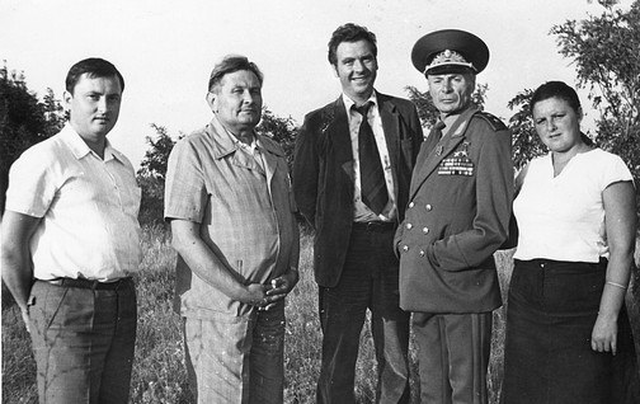
After the end of the Great Patriotic War as an exception, noting the high achievements of a brave officer, Stalin signed an order for the Guard to enlist Lieutenant Colonel Vasily Perov in the ranks of the USSR Supreme Soviet for life. After the war, Vasily Stepanovich continued his military service. In 1954, he successfully graduated from the history department of the Lvov State University. Ivan Franko. At university, he studied in absentia. Later, he successfully defended his thesis: "Prince Bismarck and the emergence of the German Empire 1860-1871's." It should be noted that the service in peacetime and the ascent of the career ladder cost him great work. And the dissertation, and later his memoirs, an armless invalid, he wrote personally. To do this, he worked daily for 14-16 hours, led his notes with a pencil between his teeth, and later learned to write with his toes.
In 1963, Vasily Petrov, who was then serving in the small town of Nesterov (Lviv region) in the modest post of deputy commander of the 35 brigade of operational tactical missiles, received another military rank of major general. The next step of his career was the post of deputy commander of artillery and missile forces of the Carpathian Military District. In 1977, he became lieutenant-general of artillery. After the collapse of the Soviet Union and the formation of an independent Ukraine, Vasily Stepanovich, according to the Decree of the President of Ukraine of March 11 1994, was left in military service in the Armed Forces of Ukraine for life. In 1999, he was given the rank of colonel-general of artillery of the Armed Forces of Ukraine. The last years of his life, he served as Deputy Commander of the Missile Forces and Artillery of the Main Command of the Land Forces of the Armed Forces of Ukraine. During these years he was engaged in active scientific, civil and military activities.
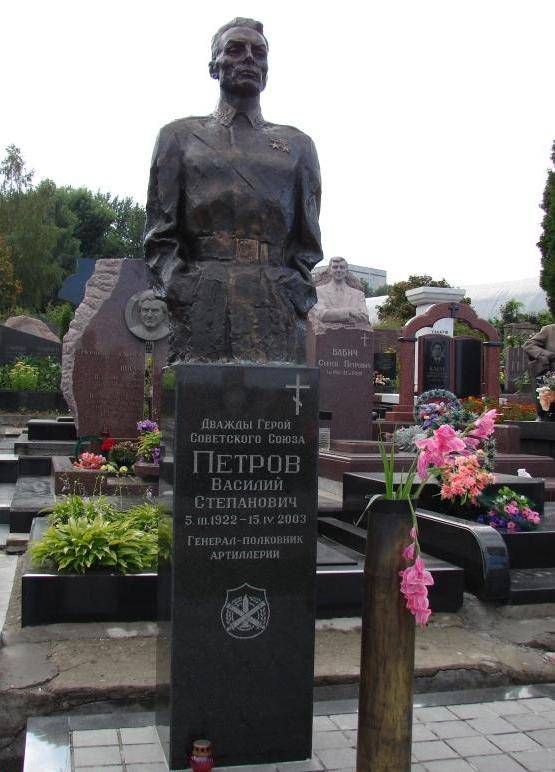
The celebrated veteran, the hero of the Great Patriotic War, died 15 on April 2003 of the year at the age of 81 of the year. He was buried in Kiev at Baikovo cemetery. Here is a monument to the hero, the money for which was collected by his sons, who also tied their lives with the army service.
Based on materials from open sources
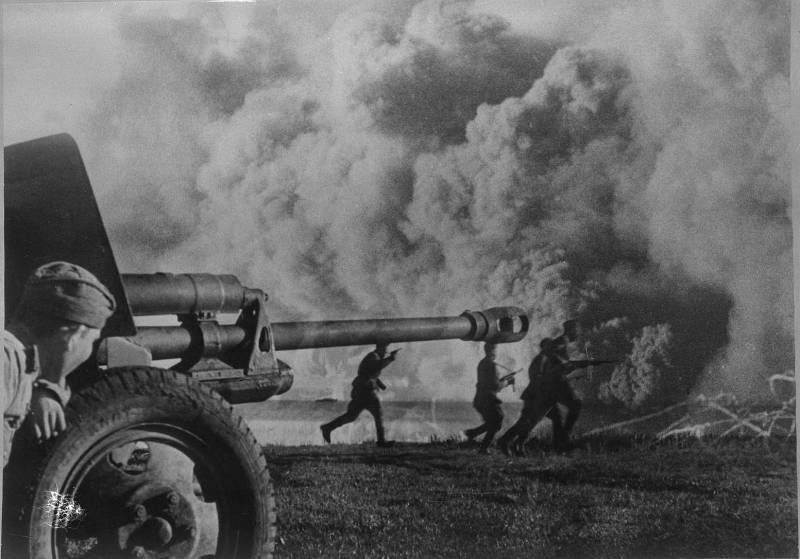
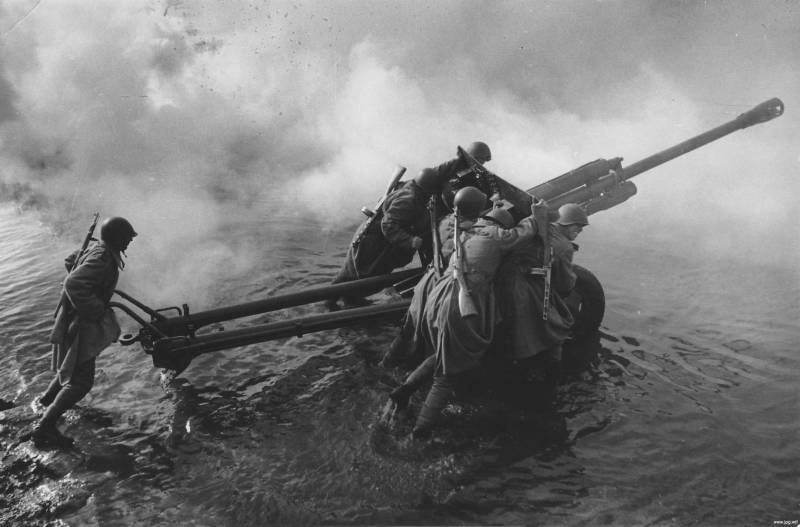
Information